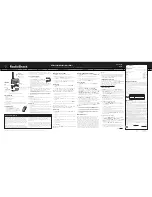
B.
Flying at an altitude of 6000 feet AGL, channel the NAV Active to a
VOR facility 10 NM away and fly inbound.
1.
Check course width .
2.
Observe the VOR warning flag while approaching, passing
over, and flying outbound: TO/FROM indicator shall indicate
correctly and the warning flag must be out of view except
when passing directly over the station.
C.
Flying at an altitude of 6000 feet AGL, channel the NAV Active to a
VOR facility 25 NM away and fly inbound.
1.
Operate the communication transceiver: VOR Left-Right
indicator transient deviations should not exceed 2 dots and
steady state errors should not exceed 0.5 dot.
LOC and GS
A.
Flying at an altitude of 3000 feet AGL, channel the NAV Active to a
LOC frequency and fly inbound to intercept ILS.
1.
From point of intercept to termination of test, neither LOC or
GS warning flags should appear.
2.
Establish glide path and fly the ILS approach: request
approach control confirmation of on-glide path condition.
3.
While on glide path, maneuver aircraft through normal pitch
and roll attitudes: Left-Right and Up-Down indicators should
perform normally and a warning flag should not be visible at
anytime.
DME
A.
Verify DME channeling when in flight.
2.11.2 COM section
A flight test should be performed to check the antenna pattern and system compatibility.
A.
Flying at an altitude of 6000 feet AGL establish two-way communications
with a ground station facility at least 50 NM away.
B.
With the aircraft flying at 6000 feet AGL, in right and left banks (up to 10
degrees), at 10 of 12 equally spaced headings establish two-way
communication with a ground station at least 50 NM away.
C.
At an altitude of 6000 feet AGL and at a distance of 20 NM from the ground
facility, fly directly toward the facility and for 20 NM beyond. Maintain
satisfactory communications with the facility during the test run.
D.
At a distance of 10 NM from the ground station put the landing gear and the
aircraft in the approach configuration. Maintain satisfactory communications
with the facility.
JUNE 1996
REV. C
18


































